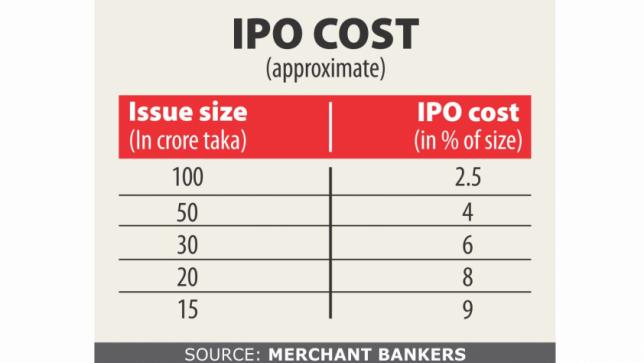IPOs lose lustre for high cost, lengthy process

Companies are losing interest in coming to the stock market because of the lengthy process stretching up to two years and the high costs to get listed.
In the last eight years, 23 companies held road shows to go public with premium but 10 got the approval and even then all but one had to wait for up to two years.
Companies that tend to go for premium, which is an added amount to the face value of the share, tend to be solid ones.
“Big entrepreneurs don't get the money when they need, so most of them lose their enthusiasm to get listed,” said the managing director of a leading merchant bank requesting anonymity.
For instance, United Power Generation had to wait two years to raise capital after its road show, arranged to gauge a company's demand among stock market investors.
Bashundhara Paper Mills and Aman Cotton needed more than two years to get money from the market after they had held their road shows; Acme Laboratories waited almost two years, while Aamra Networks hung around for one and a half years.
The procedure for initial public listing -- which is the first sale of a company's shares to the public, leading to a stock market listing -- should be easier and less time-consuming, he added.
“When we got the money in hand, our need was already fulfilled. So the BSEC should be prompt in giving its nod to IPOs. Otherwise, well-performing companies will stay away,” said a sponsor of a listed company.
As of now, Runner Automobiles, STS Holdings, Dhaka Regency Hotel, Delta Hospital, Index Agro, Popular Pharmaceuticals and Esquire Knit have been waiting for more than two years to go for listing, according to data from the Bangladesh Securities and Exchange Commission.
Merchant bankers often cite the case of neighbouring India, where the IPO processing time has been cut down.
The average time taken by the Securities and Exchange Board of India to process draft offer documents has gone down from 78 days in 2016-17 to 61 days in 2017-18.
But regulators said the lethargic IPO process prevails due to inefficiency of the merchant banks.
Saifur Rahman, spokesperson of the BSEC, said they try their best to give approval swiftly but most of the IPO documents tend to be full of misinformation and in some cases all the necessary documents are not submitted.
“So, we have to send them queries and once we are satisfied with the response we don't delay matters any further,” he added.
Since it is not possible to give an exact time frame by which the funds would flow in, many big investors get discouraged and turn to banks to meet their funding needs, said a top official of a leading merchant bank seeking anonymity.
Besides, the cost to get listed is another deterrent.
For instance, if a company wants to raise Tk 100 crore they have to spend 2.5 percent on an average, including the merchant bank's fees.
The stock market has a serious shortage of good companies, said Mizanur Rahman, professor of Dhaka University's accounting and information system department.
The regulator has to come up with a solution to the problem. Otherwise, the market will not see any significant improvement, he said.
